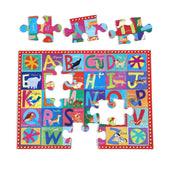Engaging in activities like solving jigsaw puzzles can contribute to cognitive development and may offer certain intellectual benefits. Puzzles can positively impact various cognitive functions. Here are some ways in which jigsaw puzzles may be associated with cognitive benefits:
-
Problem-Solving Skills: Jigsaw puzzles often require logical reasoning and problem-solving skills. As individuals work on fitting pieces together, they develop strategies for finding the right connections and completing the overall picture.
-
Spatial Awareness: Jigsaw puzzles enhance spatial awareness, as individuals need to recognize patterns, shapes, and relationships between pieces. This spatial reasoning ability can extend to other areas of life where spatial understanding is crucial.
-
Memory Improvement: Memory is engaged as individuals remember the shapes, colors, and patterns of puzzle pieces. Recalling the details of a puzzle and identifying where specific pieces fit contribute to memory improvement.
-
Attention to Detail: Completing a jigsaw puzzle requires attention to detail, focusing on the nuances of each piece to ensure they fit together correctly. This attention to detail can be beneficial in various aspects of life.
-
Concentration and Patience: Solving a jigsaw puzzle requires concentration and patience. The process of patiently working through the puzzle helps develop sustained attention, a valuable skill in many situations.
-
Stress Relief: Engaging in activities like jigsaw puzzles can be a form of stress relief. The focused and repetitive nature of puzzle-solving can have a calming effect, promoting mental well-being.
Jigsaw puzzles can benefit the brain by promoting cognitive functions such as problem-solving skills, spatial awareness, and attention to detail. The activity engages memory, encourages logical reasoning, and provides a mental challenge, contributing to overall cognitive stimulation and potentially supporting brain health.

























